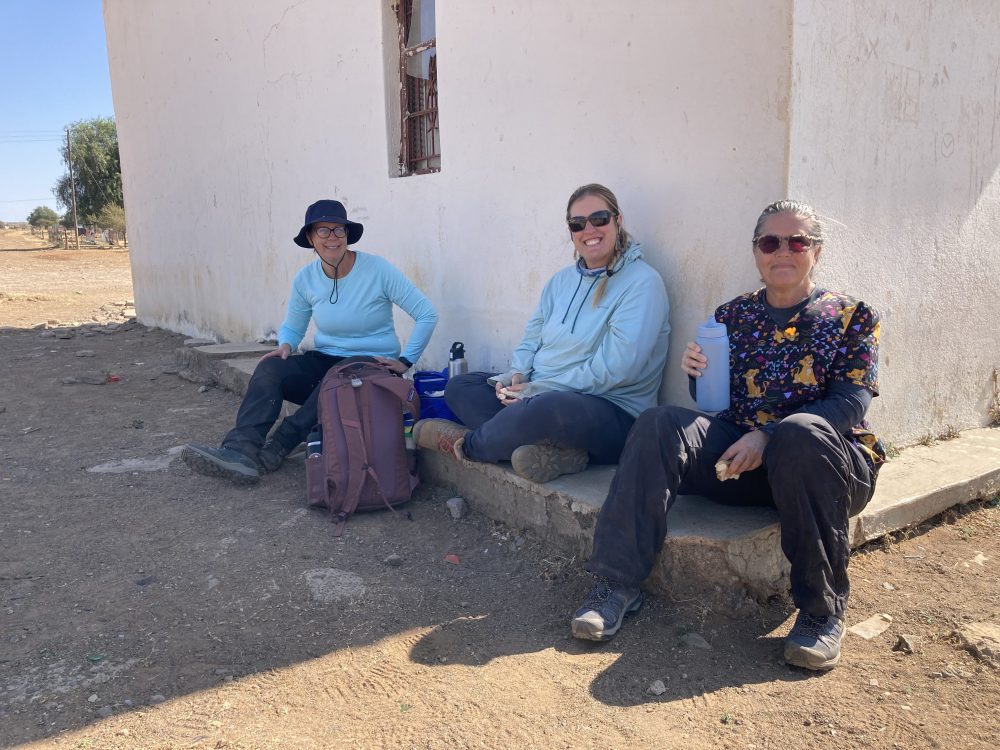
Being an Adult Leader on a Service Project
Serving as an adult leader on a Round Square International Service (RSIS) project is more than a professional opportunity, it’s an experience that blends cultural immersion, service learning, and personal growth. For some, like Kate and Courtney, RSIS has become a multi-year commitment; for others, like Dickson and Shelly, their first project has opened doors they now feel called to walk through again. Across all levels of experience, a shared spirit of responsibility, adaptability, and reflection defines the heart of this work.
Courtney Pickering, formerly of St Mildred’s-Lightbourn School and now at Havergal College in Canada, vividly recalls the nerves of her first RSIS project in Morocco, where she joined a group of around 60 students and eight other adult leaders high in the Atlas Mountains. “It felt like going to a conference where I didn’t know anyone,” she says. “But I trusted that the shared purpose would pull us together—and it did.” That discomfort proved essential—not just for her, but for the students watching. “When students see you navigating discomfort with openness, it gives them permission to do the same.”
Courtney has since been involved in Thailand and most recently been the Project Leader in South Africa—each project shaped by its own context, yet guided by the same Round Square values. After COVID, she noticed a striking change in student behaviour. “Taking phones away in 2019 felt significant. In 2024, it felt essential.” The first 24 hours were hard, but what followed was remarkable. “You could almost see them remembering how to be present.”
Kate Anderson, who began her RSIS journey at St Philip’s College and is now at Kinross Wolaroi School in Australia, is a repeat leader with several RSIS projects behind her. She echoes the importance of presence—and patience. “I’m a pretty impatient person in everyday life,” she laughs. “But I manage it well on a project—and I’ve learned that if I can do it there, I can do it more at home and in the classroom.”
Her leadership philosophy centres on adaptability. “There are different styles of leadership that are powerful at different times,” she explains. On RSIS projects, that might mean stepping back to let students take initiative or stepping in when things feel uncertain. “I’ve learned to observe, to shift gears when needed, and to model the kind of leadership I want my students—and colleagues—to take away from the experience.”
That sense of modelling—the invisible but powerful work of showing rather than telling—is something all RSIS adult leaders come to appreciate. As Kate puts it, “It’s not about being in control, it’s about creating space for growth.”
For Dickson Maina from Starehe Boys Centre in Kenya, and Shelly Burnham from Strathcona-Tweedsmuir School in Canada, their 2025 project in South Africa was a first, but already, but the experience has been profound. “It’s an opportunity of a lifetime,” says Dickson. “Interacting with students and community members—your life will never be the same.”
Shelly adds, “There are so many incredible leaders across Round Square schools. Projects like these let us learn from each other and bring our strengths to something meaningful.” She also speaks to the privilege of influencing young minds: “I have no doubt these students will do amazing things in their lives. And if we had any tiny impact on that, then it was worth it.”
From Project to Practice: A Ripple Effect
Adult leadership on RSIS projects doesn’t end when the trip does. These experiences ripple outward—into classrooms, school communities, and professional lives. Courtney describes how her work in Morocco helped students back home empathise with communities affected by natural disasters. Kate has used her project experience to rethink how she fosters student independence and intercultural learning.
And the connections endure. “We still have a group chat from the Morocco project,” Courtney says. “Those relationships are invaluable—you can reach out for advice from someone in India or Australia.” RSIS projects build a global professional network, grounded in shared values and mutual respect.
Adult leadership on an RSIS project is a demanding, joyful, and deeply human experience. It’s early mornings, dusty boots, tough conversations, and quiet moments of breakthrough. And in the end, it’s about showing up—imperfectly, fully, and with a spirit of responsibility—for the sake of something bigger than yourself.
As Dickson puts it: “Your life will never be the same.”
How-To Guide: Becoming an Effective RSIS Adult Leader
1. Step In, Even If You Feel Unready
You don’t need to have it all figured out. Whether it’s your first time like Dickson and Shelly or your seasoned project leader like Kate and Courtney, trust that you’ll grow through the experience—and that your presence matters.
2. Prepare With Intention
Use pre-trip Zoom calls and WhatsApp groups to build rapport with your fellow leaders. These early connections become the scaffolding for teamwork and mutual support.
3. Model What You Want to See
Whether it’s resilience, cultural humility, or being fully present, students are watching. When you show up authentically—even in discomfort—you give them permission to do the same.
4. Embrace Cultural Differences With Curiosity
Misunderstandings will happen. Don’t fear them—use them as opportunities for learning and dialogue. Shared language and community norms can unite, not erase, individual identity.
5. Lead with Adaptability
As Kate says, different leadership styles are powerful at different times. Listen, observe, and shift your approach as needed. Let students lead when they’re ready, and step in when they’re not.
6. Build—and Lean On—Your Network
Stay connected with fellow leaders. They’re more than colleagues; they’re a global support system for your work and your growth.
7. Bring It Home
Transform what you’ve learned into classroom practice. Share stories, create opportunities for intercultural engagement, and lead your own community with greater perspective.
8. Remember the Why
This isn’t just about volunteering—it’s about service, leadership, and impact. You’re not only helping build classrooms or mosques; you’re helping build future global citizens—and reshaping yourself in the process.
